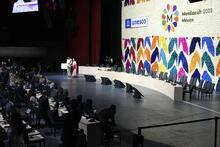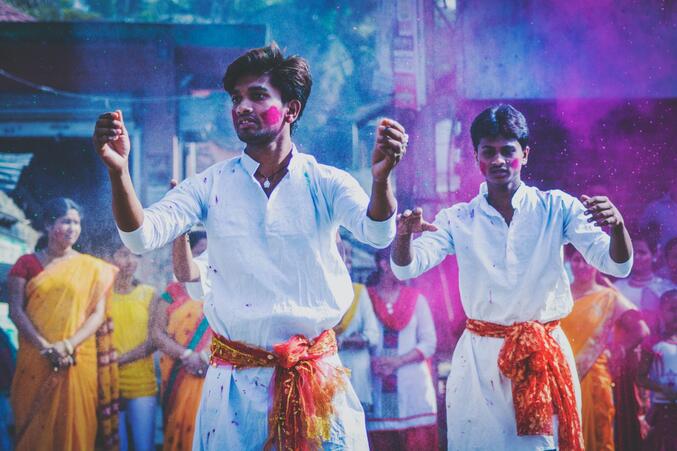UNESCO´s World Conference on Culture 2022: Op-Ed by Martin Inthamoussú, World Fellow 2022

Cultural policies in the magnifying glass: Mondiacult 2022
By Martin Inthamoussú
The UNESCO World Conference on Cultural Policies and Sustainable Development – MONDIACULT 2022 – convened by UNESCO, happens exactly forty years after the first Mondiacult World Conference on Cultural Policies held in Mexico City, Mexico, in 1982. That summit was the base of what would later happen in cultural public policies around the world. As many of the countries of our region were emerging from dictatorships, this conference served as the basis for what would become the structures of subsequent public policy. It was in 1982 that somehow UNESCO framed culture and managed to include in its conception all the distinctive features, spiritual and material, intellectual and affective that characterize us.
This month, UNESCO invites its member states and the international community to reflect again on cultural policies to address global challenges and to outline immediate and future priorities. The purpose of the reflection, according to UNESCO itself, is to shape a more robust and resilient cultural sector, in line with the prospects for sustainable development framed in the report of the Secretary-General of the United Nations. The Conference seeks to pave the way for the full integration of culture as a global public good in the post-2030 Agenda for Inclusive and Sustainable Development.
2022 finds us in a very different global context from 1982. That moment placed us in a world still looking at the Cold War. Today, coming out of a pandemic that greatly impacted arts and culture, thinking about culturally based international relations is key to building citizenships that respect identities and build bridges between nations with diversity, equity and inclusion.
This new forum takes place on 28, 29 and 30 September in Mexico City, with the participation of Ministers of Culture (or their delegates) from UNESCO’s 193 member countries. The preparations to reach that date have already included dozens of pre- conferences by regions and strategic alliances to reach the conference with proposals for possible public policies by the most relevant public bodies. This edition aims to affirm culture as a global public good and it is key that in the agreements that will come out of it there is participation and collaboration in the strategic vision of the great challenges to come.
It was culture and creativity that kept us together during the pandemic, it is culture that invites us to recognize ourselves in our different, enriching international contexts from the local to the global, it is the resilient culture that will forge paths of peace and understanding, and it will be culture that is at the forefront of sustainable development. But for that to happen, we need national public policies to give and assure the means to do so. Such policies must be built together and must respect the diversity of nations to ensure their sustainability and the resilience of the creative and cultural sectors. UNESCO then sees the need to adapt to the current context and outline a common vision for the reconstruction of a more solid and resilient sector, fully anchored in public policies and the need to promote sustainable development beyond 2030. (Ottone)
The Inter-American Development Bank is not only invited to participate but will lead the table on the future of the Creative Economy in Latin America and the Caribbean. It is no coincidence that the IDB has this important role in the conference. For many years, culture and creativity have been the focus of the bank: the creation of the orange economy within it; the promotion of new management models for the creation and production of cultural goods and services; and, clearly, the survey and analysis of financing tools in countries. The Bank has measured, like few institutions, the impact of culture and creativity and their potential for job creation, sustainable development, and the ability to contribute to the intersectional and transversal solution of old problems in other sectors.
“It was culture and creativity that kept us together during the pandemic, it is culture that invites us to recognize ourselves in our different, enriching international contexts from the local to the global, it is the resilient culture that will forge paths of peace and understanding, and it will be culture that is at the forefront of sustainable development”
Multilateral organizations such as the IDB must bring to the table development perspectives that differ from other parts of the world. Latin America and the Caribbean shoulder the responsibility of bringing new sources of knowledge, new data and fruitful fields of creativity and knowledge. Pablo Raphael De la Madrid, coordinator of Mondiacult 2022, in a recent interview stated that Latin America will shine as a large part of Mondiacult’s agenda, thanks to the clarity that there is in how to design public policies, the challenges to legislative reforms, and indicators of success. During the last 25 years, the region has been able to build a cultural agenda with instruments that work and allow access to resources.
But institutional participation is only the beginning. Communities must be at the centre, and Mondiacult must ensure that diverse voices will be heard. Today, it is not possible to think about cultural public policy without having communities at the centre, not only as recipients of the ideas of decision-makers, but as active participants in the process of critical thinking. Participation is what allows culture to be diverse and have high level of social commitment and engagement.
Mondiacult is, then, the most important opportunity to put cultures at the centre of the discussion, communities at the focus of policies, and for organizations like the IDB to make their knowledge available.
Learn more about the author´ and his projects at: https://www.martininthamoussu.com/
